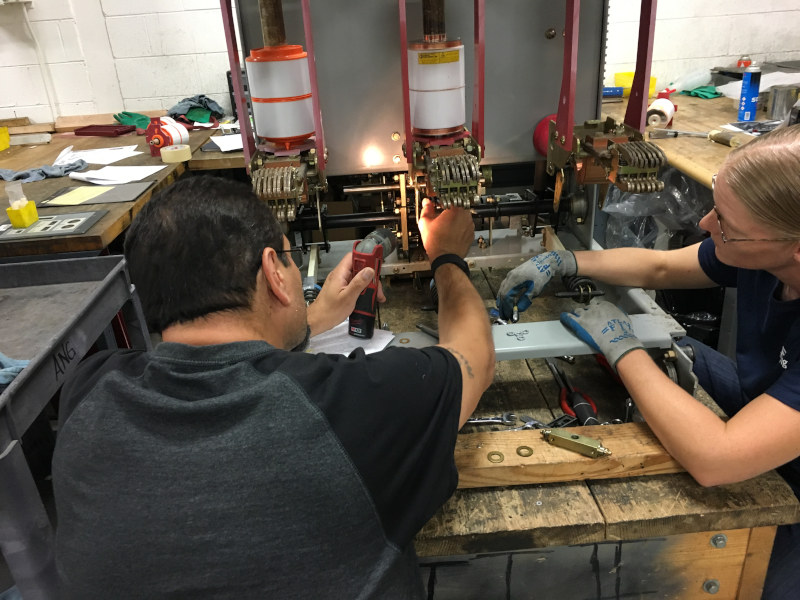How to Repair Industrial Circuit Breakers
March 20, 2024

What are industrial circuit breakers?
Industrial circuit breakers are specialized electrical components designed to protect electrical circuits and equipment within industrial environments.
Often classified by voltage class and type, they serve a crucial role in safeguarding against overloads, short circuits, and other electrical faults that could lead to damage, fires, or injuries. Industrial circuit breakers are typically more robust and capable of handling higher voltages and currents compared to residential or commercial circuit breakers.
Types of industrial circuit breakers include:
-
Molded Case Circuit Breakers (MCCBs):
MCCBs are compact, enclosed circuit breakers commonly used in industrial applications. They feature a molded case housing containing the circuit breaker mechanism and are available in various voltage and current ratings.
-
Air Circuit Breakers (ACBs):
ACBs are larger, open-frame circuit breakers designed for higher current applications. They use air as the arc extinguishing medium and are suitable for protecting large motors, generators, and distribution systems.
-
Vacuum Circuit Breakers:
Vacuum circuit breakers use a vacuum to extinguish the arc when the contacts separate. They offer fast and reliable interruption of currents and are commonly used in medium and high-voltage applications.
-
SF6 Circuit Breakers:
Sulfur Hexafluoride (SF6) are medium circuit breakers that are compact and suitable for applications where space is limited, such as high-voltage substations.
How do industrial circuit breakers work?
Industrial circuit breakers work by monitoring the flow of electrical current within a circuit, interrupting it when necessary to protect equipment and personnel from overloads, short circuits, and other electrical faults.
When the electrical current exceeds a predetermined threshold, such as during an overload or short circuit, the circuit breaker’s trip mechanism is activated, causing the contacts to rapidly separate. This interruption of the electrical circuit prevents the flow of current, effectively isolating the fault and preventing damage to the equipment.
After the fault is cleared and the circuit breaker is reset, normal operation can resume. Industrial circuit breakers employ various mechanisms, such as thermal, magnetic, or electronic trip units, to detect abnormal currents and initiate tripping. Additionally, advanced features like selective coordination and arc flash mitigation help enhance the safety and reliability of industrial electrical systems.
Can industrial circuit breakers be repaired?
Playing a critical role in maintaining the safety and efficiency of electrical systems, industrial circuit breakers, like any mechanical or electrical component, can malfunction over time.
Factors such as wear and tear, environmental conditions or improper use can all cause issues and potential damage, so it’s important to know how to repair your industrial circuit breaker to ensure your operations are uninterrupted and costly downtime is little to none.
When circuit breakers become damaged or broken, the quickest solution to prevent downtime is to get a replacement. However, this can be a costly business decision to make, which is why it’s important to continually monitor and maintain your machinery to avoid having to spend thousands of dollars on buying a replacement. If you catch a problem before it’s too late, you can repair an industrial circuit breaker to get it up and running again, saving precious time and money on waiting for a replacement.
Here we explain how our Quad Plus technicians make repairs and what to look out for:
- Identify the problem: The first step in repairing an industrial circuit breaker is identifying the underlying issue. There are several signs that you need an industrial circuit breaker repair, so it’s important to look out for potential early issues such as, frequent tripping, burning or scorching and components that feel hot to the touch.
- Follow proper safety precautions: Before attempting any repairs on an industrial circuit breaker, it’s crucial to follow proper safety precautions to prevent electrical accidents and injuries. This includes de-energizing the circuit, using appropriate personal protective equipment (PPE), and following lockout/tagout procedures to isolate the power source.
- Disassemble and inspect components: Once the circuit breaker is safely de-energized and isolated, it can be disassembled for inspection. We carefully examine each component for signs of damage, wear, or corrosion, cleaning any dirt or debris that may have accumulated inside the circuit breaker, as this can affect its performance.
- Replace parts and components: If any components are found to be damaged or faulty during the inspection, we replace them with new ones. Common replacement parts include contacts, springs, trip mechanisms, and arc chutes.
- Calibrate and test: After replacing any faulty components, we calibrate and test the industrial circuit breaker to ensure proper operation. This may involve adjusting the trip settings, testing the functionality of the trip mechanism, and conducting a series of electrical tests to verify that the circuit breaker can handle the expected load.
Repairing industrial circuit breakers requires a combination of technical knowledge, careful inspection, and adherence to safety protocols. That’s why we ensure all our experienced maintenance personnel have extensive circuit breaker knowledge and follow proper repair procedures to ensure the continued reliability and safety of electrical systems in industrial settings.
Regular preventative industrial circuit breaker maintenance and inspection is crucial to help identify potential issues before they escalate into major problems, minimizing downtime and maximizing productivity. Remember, when in doubt, consult with qualified electrical professionals, like our experienced Quad Plus team, to ensure the safety and integrity of your industrial circuit breakers.
Get in touch for industrial circuit repair services by certified Quad Plus breaker technicians.






